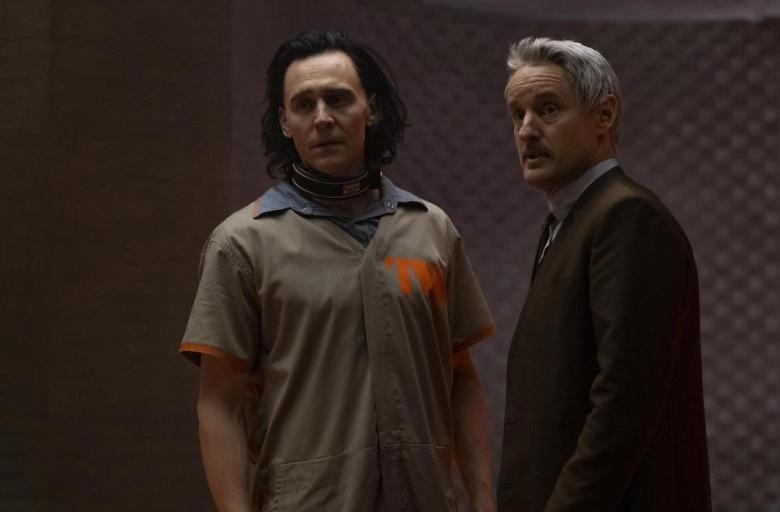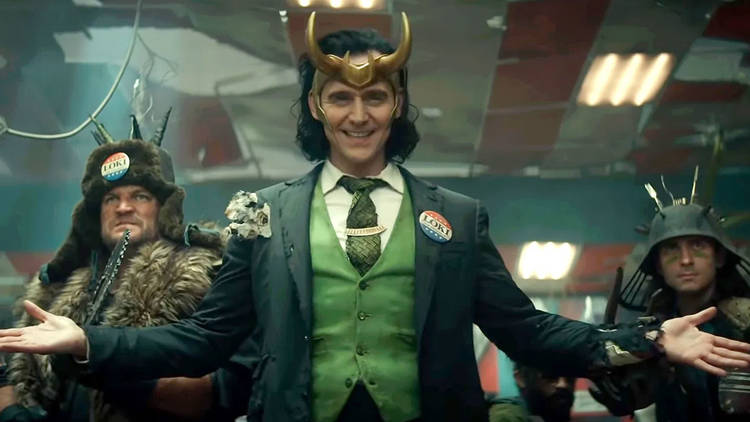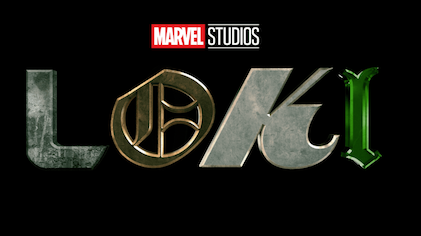After six episodes, the first season of Marvel/Disney+’s latest series, Loki has come to an end. Opening up moments after Avengers: Endgame, we follow the God of Mischief, once again played by Tom Hiddleston, has he’s tossed into a wild and wacky world of time travel and alternate realities. So how does the show’s first season fair now that it’s all said and done?
After grabbing the Tesseract during the events of Endgame, Loki is whisked away and is quickly apprehended by the Time Variance Authority, a sort of cross between the Men in Black but if their offices were designed by the same team who designed the Sterling Cooper building from Mad Men. Loki, still technically evil having been plucked straight from the 2012 Battle of New York from the original Avengers, is still preaching on about his “glorious purpose”, despite being in a place where they see him as an anomaly on the Sacred Timeline and thus, must be eliminated.
Enter Mobius, a surprisingly scene stealing Owen Wilson, who elects to recruit Loki to the TVA after showing him what the future holds for the God of Mischief. The show’s highpoint is when it pairs Mobius and Loki together as the duo just worked so well, whether they were on opposing sides or when they were on the same page and working together. The show illustrates Loki’s reconciliation with his brother, Thor, right before Thanos ultimately kills him. It’s a clever way of getting Loki to switch from villain to hero, I wish it would have happened in episode two, as inserting that into the first episode very much felt like a decision to pivot Loki’s character traits early on in the show, because Disney wouldn’t want to market a show around the villain, one who killed Coulson only hours ago let’s not forget. Loki, faced with either being “pruned”, aka being erased from the timeline, or helping the TVA, naturally chooses the option that ensures his survival, all while coming up with his own schemes in the process, namely to kill off the mysterious Time-Keepers who govern all of time and the TVA itself.

The best thing the show has going for it, at least on the first viewing and aside from Owen Wilson, is the sense of mystery. At the end of each episode, I kept asking “where is this going, what’s next, why are they doing what they’re doing”. It was refreshing to have a show that wasn’t so obviously laid out (ironically-more on that later) and it kept me wondering and theorizing over the course of the six weeks the show ran for.
So Loki ends up working with the TVA in pursuit of a variant that is ultimately revealed to be a female version of Loki. Dubbed Sylvie, who may or may not be a new iteration of the Marvel character Enchantress, Sylvie is in many regards, very “Loki”. She’s stubborn, manipulative and not trustworthy. So she’s the perfect partner for “Prime Loki” to work with. The God of Mischief quickly abandons his plan to help the TVA capture the variant and works with Sylvie to take down the TVA and reclaim their own lives. Sylvie is an interesting character in theory, but I didn’t really buy into her being a Loki and I wasn’t a fan of the bizarre romance between her and Loki (because, you know, the same person).

After they team up, we’re at the halfway point of the show in episode three, which is where the show begins to feel a little less interesting overall. This episode didn’t really do it for me, as it largely felt like padding that didn’t develop the characters as much as I would have liked beyond the two Lokis building up the foundations for a potential romantic relationship (which, let’s me reiterate, is pretty weird, right?).
Thankfully, the show bounces back on the fourth episode, The Nexus Event, which is arguably the strongest episode of the season. It once again picks up the mystery aspect and tosses more questions on the table by revealing that the Time-Keepers were just androids programmed by an unknown. Mobius and Loki are then seemingly killed off by way of pruning, but it’s revealed they were instead transported to the Void, which is naturally full of Lokis due to the survival instinct of the character.
Like episode three, episode five, Journey Into Mystery, felt like it took a lot of time to do/say very little and it ultimately felt padded and out of place. Also, just for the record, the President Loki variant looks like a much more fun version of Loki to watch. Prime Loki was interesting, but he was a bit nerfed, right? His boisterous personality felt very downplayed, as did his use of magic and illusion, and President Loki’s grand and theatrical entrance felt more on-point for the character.

The finale answered the question “what is the point of the show”. Throughout five episodes, that was the big question. What’s the endgame here, why are we following Loki through space and time. There wasn’t a clear answer until we came to the end and met He Who Remains, a variant of the classic Marvel villain Kang the Conquer and creator of the TVA. He Who Remains reveals that he laid the path (what I meant above) for Sylvie and Loki to follow to get them exactly at this point in time, where the timelines begin to fracture. He offers them a choice, either kill him (which is what Sylvie really wanted to do, allowing herself to be free of the TVA), or for them to assume his responsibilities. Kang isn’t a superpowered individual perse, but has lived for eons in this void in time and has gone a little stir crazy as a result. But he’s also a genius as he played both Loki and Sylvie, the latter of which gives into her emotions, calling He Who Remains a liar and kills him, which opens up the door an infinite amount of timelines within the multiverse that can’t be undone by way of pruning. He Who Remains basically wins and sets himself up as a sort of Master of the Universe, as it were, by means of his variants. It’s a nice twist and one that will likely set the stage for Dr. Strange and the Multiverse of Madness, Spider-Man: No Where Home and Ant Man and the Wasp: Quantumania, the latter of which will see Jonathan Majors return as Kang.

In the end, Loki was a fun series that has huge implications on the MCU. Despite being six episodes, the season does feel a bit padded overall and Loki did feel a bit nerfed and not as kinetic as he usually is in the films. But the sense of mystery and intrigue that permeated through the season was kept the show going overall, and the screen presence of Owen Wilson’s Mobius. This is a good show that could have been great if not for some filler and some weird character beats. But it’s a must-watch for keeping up to date on all things MCU.

6 thoughts on “‘Loki’ Season 1 Spoiler Review – ScreenHub Entertainment”